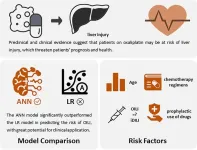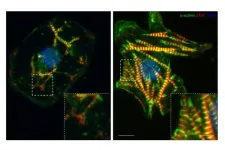(Press-News.org) BOSTON – The vast majority of liver transplant centers in the United States use language on their websites that can be considered stigmatizing through their use of words like “alcoholism,” “alcoholic” and “alcohol abuse,’ potentially hindering care and the willingness of patients to seek treatment, a study by Massachusetts General Hospital (MGH) has found.
In highlighting a significant gap between that online usage and the practice recommendations of medical societies, researchers called for a large-scale awareness and education campaign that encourages language in patient-facing materials that is more sensitive and non-stigmatizing. The study was published in JAMA Network Open.
“We learned that many of these websites use words that can be seen as judgmental, like ‘alcoholic,’ instead of more neutral, respectful terms like ‘alcohol use disorder,’” says lead author Rachael Mahle, MD, an internal medicine resident at MGH. “This is important given that words used in healthcare can affect how patients feel and whether they seek clinical help. Our findings suggest there is a need for these websites to use kinder language which would help patients feel more comfortable and supported when they look for health information or treatment they need.”
The investigation was prompted by the recognition of researchers that the perceived stigma attached to alcohol use disorder (AUD) and alcohol-associated liver disease (ALD) can lead to delayed disease detection and potentially impact intervention strategies and liver transplant allocation decisions. They set out to determine to what extent accredited U.S. liver transplant centers and addiction psychiatry websites at the same institutions have adopted the recommendations of multiple professional societies to use non-stigmatizing language.
To that end, the team systematically analyzed the use of language deemed to be stigmatizing on 114 liver transplant center websites and 104 addiction psychiatry websites across the country. The results were validated using a chi-squared test, a statistical hypothesis tool commonly used in research.
The results showed that stigmatizing language was prevalent across 88 percent of transplant center websites and 46 percent of addiction psychiatry websites.
In the context of AUD-specific references, nearly 80 percent of transplant websites used only stigmatizing language, compared to 31 percent of addiction psychiatry sites. As for ALD-specific references, 67 percent of transplant websites used stigmatizing language exclusively, 20 percent used non-stigmatizing language, and 13 percent used mixed language.
“The gap between professional society recommendations and actual practice is concerning since patients frequently use these online resources for information which can significantly influence their behavior and perceptions about alcohol-associated liver disease,” notes Wei Zhang, MD, PhD, senior author of the study and an attending gastroenterologist at MGH. “Our findings underscore the need for hospitals to improve their communications by updating their language to align with patient-first, non-stigmatizing approaches which we know from experience can lead to better health outcomes.”
A critical step toward that goal, according to the study, is the development of educational initiatives for healthcare providers focused on the importance of patient-centered communications, a task that should involve collaboration between healthcare institutions and professional societies. Moreover, public understanding around the issue should be raised through patient education and awareness campaigns, as well as implementation of feedback mechanisms on websites and regular content audits to help ensure appropriate language standards. MGH researchers, for their part, plan to expand their work in this field by studying the use of stigmatizing language in the patient notes which doctors compile.
“The slow adoption of non-stigmatizing language may be due to a lack of awareness about its association with healthcare and resistance to change,” explains Zhang. “The steps we are recommending should not only help to align clinical practice with sound language guidelines, but also foster a more empathetic and supportive healthcare environment for patients.”
Zhang is a gastroenterologist and hepatologist at MGH, and assistant professor of Gastroenterology at Harvard Medical School. Lead author Rachael Mahle, MD, is an internal medicine resident at MGH. Co-authors include Jay Luther, MD, a gastroenterologist at MGH and assistant professor of Medicine at Harvard Medical School; Adedayo Okanlawon, MD, an internal medicine resident at MGH; and Jeremy Louissaint, MD, an assistant professor of Internal Medicine at UT Southwestern Medical Center.
About the Massachusetts General Hospital
Massachusetts General Hospital, founded in 1811, is the original and largest teaching hospital of Harvard Medical School. The Mass General Research Institute conducts the largest hospital-based research program in the nation, with annual research operations of more than $1 billion and comprises more than 9,500 researchers working across more than 30 institutes, centers and departments. In August 2021, Mass General was named #5 in the U.S. News & World Report list of "America’s Best Hospitals." MGH is a founding member of the Mass General Brigham healthcare system.
END
Stigmatizing language on liver transplant center websites may discourage patients from seeking treatment
2024-02-08
ELSE PRESS RELEASES FROM THIS DATE:
Heart-to-heart connection: Exploratorium and Gladstone bring a breakthrough science exhibit to life
2024-02-08
One of the country’s best-known science museums, San Francisco’s Exploratorium, is located less than three miles north of Gladstone Institutes—a proximity that has resulted in creative, high-science collaborations like the permanent exhibit featured in the latest issue of Stem Cell Reports.
Among the museum’s most popular exhibits, “Give Heart Cells A Beat” opens a rare window into the microscopic world of the beating human heart, using technology and materials made ...
Predictive model of oxaliplatin-induced liver injury based on artificial neural network and logistic regression
2024-02-08
Since 2004, several clinical studies have reported that patients with OXA frequently experienced adverse effects of liver injury (LI), typically characterized by hepatic sinusoidal injury, splenomegaly, decreased platelet count and noncirrhotic portal hypertension, which can progress to nodular regenerative hyperplasia with long-term treatment. LI also decreased hepatic functional reserve and aggravated the postoperative course of colorectal cancer patients after hepatectomy, and may affect intraoperative bleeding, postoperative morbidity, and overall survival. LI can ...
The Galapagos comes to life in new RIT Press book
2024-02-08
Natural scientist and author Robert Rothman takes readers on a reptillian tour of the Galápagos Islands in his new book, A Paradise for Reptiles: Lizards, Snakes, and Giant Tortoises of the Galápagos Islands Vol. 1: Tortoises, Geckos, and Snakes, published by RIT Press.
For more than 30 years, Rothman has led hundreds of Rochester Institute of Technology students on tours to the Galápagos Islands to observe the wildlife and landscape that inspired Charles Darwin’s theory of evolution by natural selection. Rothman’s A Paradise for Reptiles, an homage to the 19th century scientist, is an accessibly written guide for anyone interested in Darwin, the Galápagos, ...
Social media can reveal who needs the most help
2024-02-08
Language use in social media can be a useful tool for social scientists, because it reflects living conditions in areas the posts originate from.
“There is a correlation between social inequalities and language patterns in social media,” says Associate Professor Lucas M. Bietti at the Norwegian University of Science and Technology (NTNU’s) Department of Psychology.
Researchers studied 30 million X/Twitter posts from the United States. They compared the language used in the tweets to the living conditions in the counties from which the ...
Clues to cancer drug’s deadly side effects could make it safer
2024-02-08
For some leukemia patients, the only potential chemotherapy option is a drug that also carries a high risk of heart failure. This means that some patients who recover from their cancer will end up dying of heart disease brought on by the cure.
In a new study, researchers from the University of Illinois Chicago and other universities have identified mechanisms that cause the drug, ponatinib, to harm the heart. They also identified a promising treatment that could reverse this process. The paper, with senior author Sang Ging Ong, assistant professor of pharmacology and medicine at UIC, is published in Circulation Research. The study is part of a growing field called cardio-oncology ...
Surprise discovery of tiny insect-killing worm
2024-02-08
UC Riverside scientists have discovered a tiny worm species that infects and kills insects. These worms, called nematodes, could control crop pests in warm, humid places where other beneficial nematodes are currently unable to thrive.
This new species is a member of a family of nematodes called Steinernema that have long been used in agriculture to control insect parasites without pesticides. Steinernema are not harmful to humans or other mammals and were first discovered in the 1920s.
“We spray trillions of them on crops every year, and they’re ...
Are environmental toxins putting future generations at risk?
2024-02-08
In a study that signals potential reproductive and health complications in humans, now and for future generations, researchers from McGill University, the University of Pretoria, Université Laval, Aarhus University, and the University of Copenhagen, have concluded that fathers exposed to environmental toxins, notably DDT, may produce sperm with health consequences for their children.
The decade-long research project examined the impact of DDT on the sperm epigenome of South African Vhavenda and Greenlandic ...
Protecting the protector boosts plant oil content
2024-02-08
UPTON, NY—Biologists at the U.S. Department of Energy’s (DOE) Brookhaven National Laboratory have demonstrated a new way to boost the oil content of plant leaves and seeds. As described in the journal New Phytologist, the scientists identified and successfully altered key portions of a protein that protects newly synthesized oil droplets. The genetic alterations essentially protect the oil-protector protein so more oil can accumulate.
“Implementing this strategy in bioenergy or oil crop plants could ...
Physical activity is insufficient to counter cardiovascular risk associated with sugar-sweetened beverage consumption
2024-02-08
Québec, February 8, 2024 - Contrary to popular belief, the benefits of physical activity do not outweigh the risks of cardiovascular disease associated with drinking sugar-sweetened beverages, according to a new study led by Harvard T. H. Chan School of Public Health. Jean-Philippe Drouin-Chartier, professor at Université Laval’s Faculty of Pharmacy, was a co-author.
Sugar-sweetened beverages are the largest source of added sugars in the North American diet. Their consumption is associated with ...
CARB-X funds Visby Medical to develop a portable rapid diagnostic for gonorrhea including antibiotic susceptibility
2024-02-08
(BOSTON: Thursday, February 8, 2024) – Combating Antibiotic-Resistant Bacteria Biopharmaceutical Accelerator (CARB-X) will award up to US$1.8 million to biotechnology company, Visby Medical, to develop a portable rapid polymerase chain reaction (PCR) diagnostic to detect the presence of the pathogen that causes gonorrhea, Neisseria gonorrhoeae (NG), and its susceptibility to ciprofloxacin, a former frontline oral antibiotic that can no longer treat resistant NG. A rapid result on when ciprofloxacin may be effective could enable physicians to treat gonorrhea patients with confidence, while reserving ceftriaxone, the only antibiotic that remains effective against resistant NG.
Visby ...





